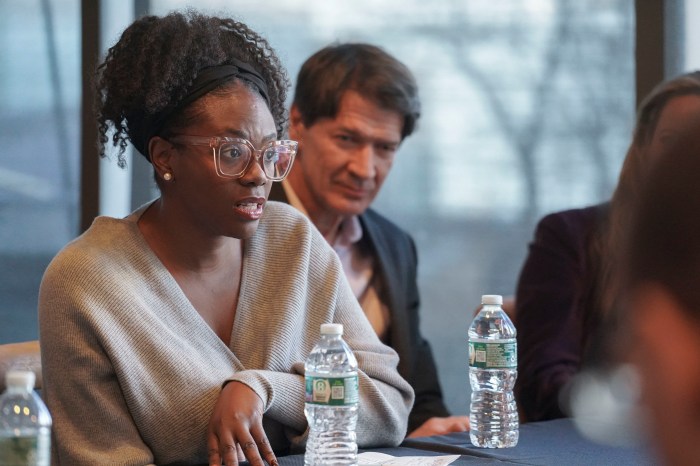By Kathianne Boniello
Queens schools — arguably some of the neediest in the city — will retain funding and support after last week’s contentious, political vote naming Manhattan mayoral appointee Ninfa Segarra as president of the city Board of Education, the borough president’s office said Monday.
The April 4 vote giving Segarra the presidency came after hours of infighting during which Manhattan Board of Ed appointee Irving Hamer reportedly switched loyalties away from Bronx member Sandra Lerner.
Terri Thomson, Queens’ Board of Education member who had been considered a candidate to lead the board after William Thompson stepped down from the post in February, was one of three members to abstain from the vote for Segarra.
Queens schools have long been some of the most overcrowded in the city, forcing the borough’s districts to move classrooms into closets, hallways and portable trailers.
Published reports have suggested that Mayor Rudolph Giuliani brokered a behind-the-scenes deal to engineer Segarra’s victory, promising more resources and input on a variety of projects for Manhattan Borough President Virginia Fields.
Dan Andrews, a spokesman for Borough President Claire Shulman, rejected the idea that projects for the city’s 1.1 million students would shift toward Manhattan with Segarra’s election.
The reports also said Thomson came under pressure from both City Hall and Shulman to vote for Segarra. Thomson, Hamer and Andrews denied these accounts.
Shulman, a Democrat, has courted the mayor’s favor to maintain the flow of city funds into her borough and crossed party lines to endorse Giuliani in his bid for a second term in 1998.
In 1998 Shulman decided not to reappoint longtime Board of Education president Carol Gresser, of Douglaston, to the board after Gresser opposed Giuliani on the ouster of then-Schools Chancellor Raymond Cortines. Gresser is now running for Shulman’s seat the longtime, term-limited borough president will be forced to step down in November.
In a telephone interview Monday, Thomson had no comment on reports that Shulman was trying to influence her vote on the Board of Ed president.
“Our relationship is very good,” Thomson said. “Claire and I work closely together and will continue to do so.”
Andrews said the vote ushering in a Board of Ed president from Manhattan would not hurt Queens.
“We don’t believe that spells bad news for Queens,” Andrews said, adding that the borough president would ask board members to work “for a common good.”
When asked if Shulman’s office had tried to influence Thomson, Andrews said “we’re not the ones saying that.”
Segarra, who has been on the board since May 1994, favors Giuliani’s position that abolishing the Board of Ed, privatizing schools and giving parents vouchers can fix the city schools.
Hamer’s vote for Segarra was surprising because the two are often on the opposite sides of such issues, as Hamer himself noted in an April 4 statement.
While it was unclear whether Thomson’s career with the Board of Ed would end after only one term, it was also not known whether candidates hoping to succeed Shulman in this year’s elections would support Thomson. Thomson’s term on the board ends in July 2002.
Only Randi Weingarten, president of the United Federation of Teachers union, which is currently locked in contract negotiations with the city, publicly acknowledged the politics of the Board of Education vote.
“Perhaps this will help dispel the myth that the mayor does not control the Board of Education,” she said in a statement.
Reach reporter Kathianne Boniello by e-mail at Timesledgr@aol.com or call 229-0300, Ext. 146.



































